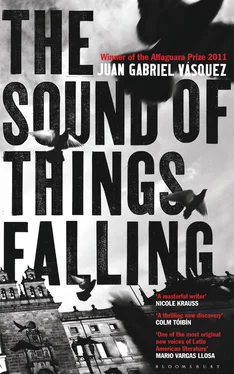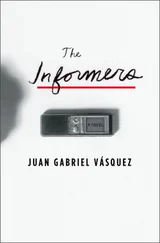And the flames were like my own hair,
red panthers loose in the young city,
and the walls of my dream were collapsing to the ground,
just as a city collapses in screams.
I drove into the parking garage of my building as if returning after a lengthy absence. Through the window a doorman I’d never seen before waved me in; I had to perform more manoeuvres than usual to get into my space. When I got out I felt cold, and I thought that the car’s interior had conserved the warm air of the Magdalena Valley and that this contrast had undoubtedly led to the violent shutting of my pores. It smelled of cement (cement has a cold smell) and of fresh paint: they were doing some work I hadn’t remembered they were starting over the weekend. But the workers had left, and there, in the parking garage of my building, in another car’s space, was a gasoline barrel cut in half, and in it the remains of the fresh cement. As a child I had liked the feeling of wet cement on my hands, so I looked around — to make sure no one would see me and think I was crazy — and I approached the barrel and stuck two fingers carefully into the now almost hardened mixture. And I went up in the lift like that, looking at my dirty fingers and smelling them and enjoying that cold smell, and so I went up the ten floors to my apartment, and was about to ring the bell with the dirty fingers. I didn’t, and not only so I wouldn’t get the bell or the wall dirty, but because something (a quality of the silence on this high floor, the darkness of the panes of smoked glass in the door) told me that there was no one home to open the door for me.
Now, there is something that has happened to me all my life when I return from sea level to the altitude of Bogotá. It’s not just me, of course, but happens to many and even the majority, but since I was little it always seemed that my symptoms were more intense than other people’s. I’m talking about a certain difficulty in breathing for the first two days after my return, a slight tachycardia unleashed by efforts as minimal as climbing the stairs or getting down a suitcase, and that lasts while my lungs get used to this rarefied air again. That’s what happened to me as I opened with my own keys the door to my apartment. My eyes mechanically registered the clean dining table (no envelopes to open, no letters or bills), the telephone table where the red light of the answering machine was blinking and the little screen indicated that there were four new messages, the swinging door into the kitchen (it had been left stuck half open, I should oil the hinges). All this I saw while feeling the lack of oxygen that my heart was demanding. What I didn’t see, however, were any toys at all. Not in the carpeted corners or abandoned on the chairs or lost in the hall. There were none, not the plastic fruit in its basket, not the chipped little teacups, not the chalk for the board or any coloured paper. Everything was perfectly orderly, and that was when I took two steps towards the telephone and played the messages. The first was the dean’s office, asking why I hadn’t taught my 7 a.m. class, and asking me to report as soon as possible. The second was Aura.
‘I’m calling so you won’t worry,’ said that voice, the beloved voice. ‘We’re fine, Antonio. Leticia and I are fine. It’s Sunday now, eight o’clock at night, and you haven’t come back. And I don’t know where we can go from here. You and me, I mean, I don’t know where you and I can go, what’s left after what’s happened to us. I’ve tried, I’ve tried hard, you know I have. And I’m tired of trying, even I get tired. I can’t do it any more. Forgive me, Antonio, but I can’t do it any longer, and it’s not fair on our little girl.’ She said this: It’s not fair on our little girl . And then she said other things, but the time the answering machine gave her had run out and her message was cut off. The next message was also from her: ‘I got cut off,’ she said with a broken voice, as if she’d been crying in between the two messages. ‘Well, I don’t have anything else to say anyway. I hope you’re fine too, that you got home OK, and that you forgive me. I just can’t do it any more. I’m sorry.’ Then came the last message: it was the university again, but not the dean’s office this time, but the secretary. They were asking if I’d supervise a thesis, an absurd project on revenge as a legal prototype in the Iliad .
I had listened to the messages standing by the phone with my eyes open but without looking at anything, and now I played them again so I could hear Aura’s beloved voice while I walked around the apartment. I walked slowly, because I couldn’t get enough air: no matter how deeply I breathed, I couldn’t get the feeling of breathing comfortably, and my closed lungs made themselves felt effortlessly, my rebellious bronchial tubes, my self-sabotaging alveoli refusing to receive the oxygen. In the kitchen there was not even one single dirty plate, not a glass or a piece of cutlery out of place. Aura’s voice was saying she was tired, and I walked down the hall towards Leticia’s room, and Aura’s voice was saying it wasn’t fair on our little girl and I sat down on Leticia’s bed and thought that what would be fair would be that Leticia were here with me, so I could take care of her as I’d taken care of her until now.
I want to take care of you , I thought, I want to take care of both of you, together we’ll be protected, together nothing will happen to us .
I opened the wardrobe: Aura had taken all of Leticia’s clothes, a child of Leticia’s age goes through several outfits a day, you have to be washing clothes all the time. My head hurt all of a sudden. I attributed it to the lack of oxygen. I thought I’d lie down for a few minutes before going to find a painkiller, because Aura was always complaining about my tendency to take medication at the first symptoms, and not give the body the chance to defend itself on its own. ‘Forgive me,’ said Aura’s voice out there in the living room, from the other side of the wall. Aura was not in the living room, of course, and I had no way of knowing where she was. But she was fine, and Leticia was fine, and that’s what mattered. Maybe, with a little luck, she’d phone back. I lay down on this bed that was too small for me, on which my long grown-up body did not fit, and my eyes focused on the mobile that hung from the ceiling, the first image that Leticia saw when she woke up in the morning, the last thing she probably saw when she went to bed at night. From the ceiling hung an aquamarine egg, four arms stuck out from the egg and from each arm hung a figure: an owl with big spiral eyes, a ladybird, a dragonfly with muslin wings, a smiling bee with long antennae. There, concentrating on the forms and colours that were moving in an imperceptible way, I thought of what I’d say if Aura called back. Would I ask her where she was, if I could go and pick her up or if I had the right to hope she’d come back? Would I keep quiet so she could realize she’d made a mistake abandoning our life? Or would I try to convince her, tell her that together we could defend ourselves better from the evil of the world, or that the world was too risky a place to be wandering on our own, without anyone waiting for us at home, who worries about us when we don’t show up and who can go out to look for us?
I began The Sound of Things Falling in June 2008, during six weeks I spent at the Santa Maddalena Foundation (Donnini, Italy), and would like to thank Beatrice Monti della Corte for her hospitality. I finished the novel in December 2010, in the house of Suzanne Laurenty (Xhoris, Belgium), and to her also go my grateful thanks. Between the two dates many people enriched and improved this novel. They know who they are.
Читать дальше












